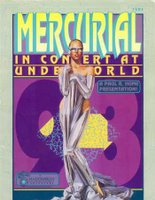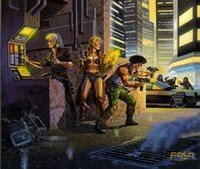 Even though I was a die-hard Cyberpunk fan, I had my experiences with Shadowrun. The AD&D group I originally played with also hosted a Shadowrun campaign, and I was happy to participate. The powers that were in that group didn't like Cyberpunk. I won't go so far as to say that they were actively adversarial to CP, but I never heard a single positive comment about it from them. They preferred the setting, magic, and metahumans of Shadowrun. I wasn't overly fond of SR's setting or mechanics, but I shouldered the burden and enjoyed it as best as I could.
Even though I was a die-hard Cyberpunk fan, I had my experiences with Shadowrun. The AD&D group I originally played with also hosted a Shadowrun campaign, and I was happy to participate. The powers that were in that group didn't like Cyberpunk. I won't go so far as to say that they were actively adversarial to CP, but I never heard a single positive comment about it from them. They preferred the setting, magic, and metahumans of Shadowrun. I wasn't overly fond of SR's setting or mechanics, but I shouldered the burden and enjoyed it as best as I could.My character was Sleeze, a city shaman from somewhere on North America's eastern coastline that claimed the rat as his totem. It was, overall, a fun character to play. I could be disgusting, cowardly, and conniving. Plus, I got to cast spells, which (by and large) is a big advantage in Shadowrun. Along with Sleeze, the PCs included at least two other magic users: an arcane spellcaster, and a wolf shaman. The three of us eventually formed some kind of pact with one another, much to our mutual benefit. We were like our own little power bloc within the party.
As with a lot of the earliest games I'd played, I don't really remember the overarching plots or themes of the SR campaign. There was a lot of inter-character action, though, that I remember. We "ran the shadows" against corporations, made enemies, and tried to get rich. It was pretty typical stuff.
 Much later on, my wife and I participated in another Shadowrun game that Josh's girlfriend, Naomi, was running. Again I took on the mantle of a shaman, but this time I chose the fox totem and the name of Todd. The game was brief; I believe we went through a book adventure, Mercurial.
Much later on, my wife and I participated in another Shadowrun game that Josh's girlfriend, Naomi, was running. Again I took on the mantle of a shaman, but this time I chose the fox totem and the name of Todd. The game was brief; I believe we went through a book adventure, Mercurial.Now, my troubles with SR started with my original group's overt and unbiased preference for the game and setting over anything else (aside from AD&D), in conjunction with their outright dismissal of my favorite game, Cyberpunk. Prior to playing Shadowrun, I'd never had a bad thing to say about it. I even bought the 1st edition book to get ideas for my own CP games. I was regularly needled about the fact that I liked CP better than SR, a fact I never denied, but I certainly don't remember turning to blows over it. To me, it wasn't that big a deal. The "SR snobbery," though, didn't improve my opinion of a game that I eventually came to view as mechanically flawed in a number of ways.
As for mechanics, we originally played the first edition rules. The system wasn't intuitive, not in the slightest. The rules weren't well-written. Back then, I never had much more than a tenuous grasp on the way things worked. I knew what dice to roll, but I always relied on the GM to determine outcomes based on my results. Combat, especially, was a headache. I'd been spoiled by Cyberpunk's "roll one die to hit, then roll damage if you do" simplicity. In SR, we were regularly rolling great gobbing handfuls of d6's, over and over again.
The setting was simply okay, in my opinion. I was never fond of the Native American magical themes, though I'm not entirely sure why. It was a different take on spiritual magic, I suppose, one that (at the time) I wasn't really into. Thinking back, it wasn't as if SR could introduce a vast pantheon of gods, as in Greyhawk or Forgotten Realms, so I guess the inclusion of tribal totems and shamanistic magic makes sense in that regard.
A lot of what was included in SR seemed like a direct rip-off of either the Cyberpunk RPG, William Gibson's novels, or both. This isn't to say that Cyberpunk wasn't heavily derivative of Gibson's work; it was. Yet CP seemed more pure, adult, and less aimed at the youth market that SR was. For example, the currency of SR, the "Nuyen," was obviously just a derivative of Gibson's "New Yen," as compared to CP's "Euro" (which was based on a type of speculative international currency).
And then there was the aforementioned maturity level of the game. I said that CP seemed a bit more adult to me at the time, while SR was obviously aimed at a broader (younger) audience. SR was nice to look at, there were orcs and elves and trolls (oh, my!), but the one thing that really got on my nerves was the lexicon of the game. Artificial curse words like "drek" grated on my nerves, and I cringed everytime someone used coloquialisms like "chummer" and "decker" when they talked. It all sounded very artificial.
Not that Cyberpunk's "chombatta" was any easier to say (or listen to).
I do have some good things to say. Shocking, yeah. For one, although the mechanics of magic were unintelligable, I did enjoy the concepts of casting. Unlike AD&D, where you had an arbitrary spell list and a limited (daily) capacity for spells, SR allowed you to cast as much as you wanted -- provided you could withstand the rigors of channeling mana and magic through your body. This was reflected in drain, which you rolled after each spell and the difficulty of which was determined by the power of the spell that had been cast. I really liked that idea.
 The other thing I liked about SR were riggers. While CP had rudimentary rules for direct neural connection to vehicles, SR explored the concept in detail. Even the name "rigger" wasn't as offensive to me as "decker," which helped quite a bit. The idea of driving a car or flying a plane with the power of my mind alone was pretty nifty.
The other thing I liked about SR were riggers. While CP had rudimentary rules for direct neural connection to vehicles, SR explored the concept in detail. Even the name "rigger" wasn't as offensive to me as "decker," which helped quite a bit. The idea of driving a car or flying a plane with the power of my mind alone was pretty nifty.I admit that my list of complaints about Shadowrun is long and (outside of the game's mechanical issues) largely superficial. These were problems I had with the game back then, and they don't necessarily apply today. The newest edition of the rules may be a shining example of harmony and simplicity, but I tend to doubt it. I've heard several gripes from folks who play the current edition of the game, and much of the lamentation stems from the clarity (or, rather, the lack of clarity) within the written rules. Still, SR continues to be supported (albeit by FanPro and not FASA). In fact, the game was always heavily supported in its heyday, and I reckon this was a result of FASA's deep pockets.
No comments:
Post a Comment